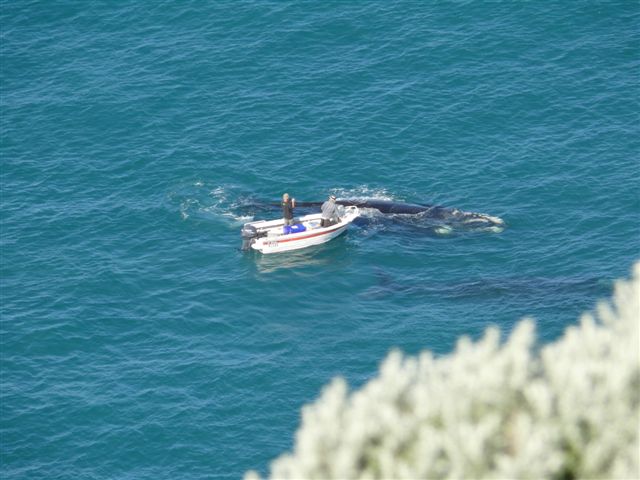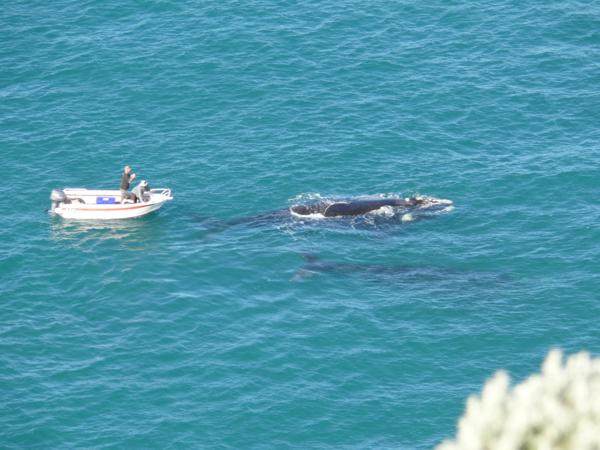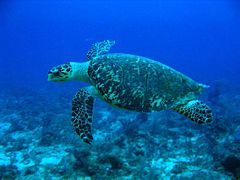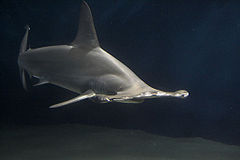Tag Archives: legal
Fisherman Gets Sent Up the River For Taking Shot at Sea Lion:
A fisherman from Northern California who took out his frustrations on a sea lion last year, has just been sentenced this past Friday to one month in jail and to pay $51,000 in restitution.
Larry Allen Legans, the fisherman who decided to shoot the poor defenseless animal, was found guilty in a court of law os “intentionally maiming or wounding an animal”. Sgt. Nevis, the name given to the sea lion, was discovered back in November of 2009 with a life-threatening hole in his snout. It was such a bad wound that the sea lion couldn’t even put his head under the water. Luckily for Sgt. Nevis, there were marine veterinarians volunteers available to help take care of him.
Not only does Legans have to spend time in lock-up, he also has to pay restitution to the Marine Mammal Center in Sausalito. This is to cover the costs of the medical bills, and also to help repay damages done to the animal.
The sea lion, which was named after the person who rescued him, recently underwent a successful reconstructive surgery this past week to help repair the huge hole in his snout. Once he has fully recovered he will become a permanent resident at Seal Cove in Six Flags Discovery Kingdom in Vallejo.
It is still unknown at this time just why the poor guy was shot in the first place, and Legans hasn’t shed any light on the subject, and is not likely to anytime in the foreseeable future.
Boat Owner Gets Slapped on the Wrist for Stalking Whales
A fine of $4,000 was given to a man from Southern Australia, because he invaded the personal space of two whales off the south coast.
For the first time ever in South Australia, Philip Kluske, who resides in the Victor Harbor area, was tried and found guilty, in the Christies Beach Magistrates Court this past Monday, of piloting a vessel within 100 meters of two whales in August of 2009.
Apparently, as the court heard, Mr. Kluske became intrigued with the whales as they approached his boat, and when they swam off he pursued them.
All things considered, Kluske got off light. The maximum penalty that can be given under such circumstances is a $100,000 fine or a two year stint in the pen.
Laurence Haegi, regional conservator of the Department of Environment and Natural Resources has explained that the rules in place are just as important for the welfare of the animals, as they are for the safety of the public.
‘Southern right whales are a vulnerable species, protected under the National Parks and Wildlife Act,’ Dr Haegi said in a statement after the case. ‘Today, the greatest threats to whales are entanglements and boat strikes resulting from human interference”.
‘The regulations are in place to ensure these magnificent animals are not harassed and stressed, often at a time when they are nurturing young calves.’
There you have it… If a whale swims away… Leave it alone… Whale harassment can land you in some pretty hot water.
Inuit Put a Halt on German-Canadian Arctic Tests
A Canadian judge in the northern province of Nunavut has curtailed the plans of several joint German-Canadian Arctic experiments after Inuit residents commented that the testing could harm marine life, sources from within the government revealed on Monday.
A judge for the territory, granted a last minute injunction this past Sunday, putting a hold on a major seismic program that was set to begin Monday in Lancaster Sound, north of Baffin Island.
The experiments, which were designed to help unearth the early history of our planet, were being carried out by Natural Resources Canada in conjunction with the Alfred Wegener Institute in Germany.
Susan Cooper, a fellow Justice, was in complete agreement with the fears that the Inuit communities were expressing, that the experiments, including the firing of an air gun under the water to collect data, could have a negative effect on the walruses, seals and whales in the area.
While the devices would not prove fatal to the sea creatures, it could possible make them deaf, and scare them away from the area for an extended period of time, explains an attorney for the Inuit, David Crocker.
“If the Inuit are right, they could lose their livelihood, their food source, their way of life,” Crocker commented to the AFP.
The Canadian government has not commented if it will appeal the decision or not.
So it looks like, for the time being at least, that the plans for gaining knowledge of the area have been put on ice, and if an appeal isn’t made soon, the tests will need to be conducted next year instead.
Filipino Government Lays the Smackdown on People Poaching Sea Turtles
Two years after their detainment, 13 poachers, from Vietnam, who were caught with the dead bodies of 101 endangered Hawksbill turtles (known in scientific circles as Eretmochelys imbricata) near El Nido, northern Palawan, in the Philippines, have finally been convicted and sentenced to hefty fines along with some jail time.
On the 22nd of June, The Regional Trial Court of Puerto Princesa, Branch 50, after much deliberation, decided that the Vietnamese poachers should face jail time for their heinous acts, and will receive anywhere from 6 to 18 months, plus have some hefty fines to pay.
Since the poachers have been sitting in jail since the 2nd of September 2008, the court also decided that they will only have to cough up the money for the fines.
Two Filipino gunboats apprehended the Vietnamese boat transporting the poachers five miles east of Cabaluan Island near El Nido on August the 29th 2008. In a sheer act of desperation, the 13 crew members aboard the boat tried to sink her by flooding the holds, however were preented from doing so by law enforcement officers.
When the cargo holds were explored, they discovered the corpses of 101 Hawksbill Turtles, classified as being critically endangered, which is the highest risk rating for any living animal. This rating was handed down by the IUCN, the International Union for Conservation of Nature, some time ago.
So, they did the crime, they served the time, now all that remains is for them to pay the fine… Although, is it really enough? Did the poachers learn their lesson? Or were they simply sorry they were caught?
PETA Lobbying for Criminal Charges to be Filed in Sea World Attack

PETA is lobbying for Sea World to be held criminally responsible for the death of Dawn Brancheau. Since that fateful day, PETA has been launching numerous campaigns against Sea World and their operational procedures.
Their first step was to publicly protest outside the theme park’s gates and now they are upping the ante.
PETA officials have been lobbying for the criminal charges, claiming that the attack on Brancheau, from a legal standpoint, is involuntary manslaughter.
“We think that is important for the attorney general to step in, investigate and prosecute this case because otherwise it is only a matter of time before another death or serious injury occurs,” explained PETA’s attorney, Jeff Kerr.
PETA’s case is clearly stated in a huge letter, address to Bill McCollum, the acting Attorney General.
PETA has said that because the officials of Sea World knew that killer whales were dangerous, and the whale which caused Brancheau’s demise was particularly dangerous, that Seaworld – which allowed employees to interact with these creatures – was in fact criminally negligent.
“Working in a dangerous job should not mean that you are exposed on a daily basis to being killed,” Kerr explained.
Of course, the officials at Sea World have a completely different view of the situation, explaining, “The allegations made by PETA today are as baseless … In our experience, both OCSO and the State Attorney conduct their work thoroughly and professionally. PETA’s letter appears to be another example of an organization more interested in media attention than assisting animals in need.”
While it was a terrible tragedy, one has to wonder, is it Sea Worlds’ fault? There is always danger when dealing with wild animals.. But could further steps have been taken?
Japanese Company Caught in $2.4 Million Fishing Bust!
A Japanese company was caught with their hands in the cookie jar. They were caught in one of the biggest fisheries bust in New Zealand, illegally reeling in 600 tonnes of fish.
The Fisheries ministry has said that Kanai Fisheries Company, Aurora Fisheries, a New Zealand fishing company, and four Japanese Citizens have pleaded guilt to a combine 54 charges in the Wellington district court.
Each charge means a hefty fine of up to $250,000, bringing the possible total to a staggering $1,350,000 in damages, not including other penalties.
Andrew Coleman, the Fisheries Ministry’s field operations deputy chief executive, has commented that the operation lasted almost two years, involved 25 staff, and was the biggest operation in the history of the organization.
He went on to comment that the Japanese company bought out part of Aurora Fisheries quota which in turned allowed them to fish in New Zealand waters.
Tomi Maru 87, the company’s fishing boat, then proceeded to catch 112 tonnes of silver warehou and 481 tonnes of ling in a short two year period. The problem is that the area where the fish were reeled in was off the southern coast of the South Island, and outside of Aurora’s quota area.
However the company reported that the fish were caught well inside these boundaries. The export value of the ill gotten fish was estimated to be in the vicinity of $2.4 Million.
It should be noted that even though a guilty plea has been entered, does not mean any convictions will be made… Only time will tell.
“Nay” to the regulation of shark fishing from the shoreline
Indian River County – The recent proposal to regulate shark fishing from the shore, may be at an impasse.
Following two months of heated discussions, the majority of the County Commission voted on Tuesday to reject Alan Polackwich’s, County Attorney, draft ordinance, without even allowing the courtesy of a revision.
“(Am I) disappointed? I can’t understand it,” Doug Distl, Carlton condominium manager commented, “This is Indian River County. We’re known for recreation, retired citizens and good things.”
Distl, who submitted his own proposal to ban the baiting and chumming of sharks off the beaches where people swim, has said that he didn’t want the county to become known as a shark fishing destination.
He has said that he is now going to focus on just getting the Indian River Shores, Orchid, and Vero Beach councils to at least regulate shark fishing.
In a 3-2 vote, the commissioners effectively shot down Polackwich’s draft. The motion to reject the proposal was made by Vice Chairman Bob Solari.
This rejection came after the commission had asked Polakwich to revise his proposal and put more focus into it on June 15th. Rather than banning shark fishing and chumming, the commissioners were after authority for lifeguards and sheriff’s deputies to order shark anglers to move their activities off the swimming beaches, and into remote areas.
Fishery Police Suspected of Misusing Fines Collected
BOSTON – The fishery police underwent an audit recently to see how they were using the federal fines they collected. It has been discovered that the fines collected from fisherman were spent on things such as cars for managers, and a week long training seminars in Norway.
The audit were released to the public on Thursday, and was commissioned by the U.S. Department of Commerce’s inspector general, when it discovered incongruities in the management of fines by the National Oceanic and Atmospheric Administration’s law enforcement office.
Inspector General Todd Zinser started the audio after the slew of complaints fisherman were filing every year about the arbitrary enforcement of the fishery laws, they claimed that the fines were being collected solely for the personal use of the NOAA.
Richard Burgess, a fisherman from Gloucester who is fighting $85,000 in fines, has said that the NOAA should cough up the money, and return it to its rightful owners.
“We’ve all known that they’re criminals,” Burgess stated in front of the law enforcement office. “Every one of them has got to go.”
Some surprising things were found out about the fund where the fines and penalties collected were deposited. The funds went to the Asset Forfeiture fund, and is managed by the accounting firm KPMG. Zinser has stated that the fund is so poorly managed, that it isn’t even listed in the NOAA’s annual budget documents. It is not known if this oversight was an accident or perfectly planned.
In a memo Zinser wrote to the NOAA chief Jane Lubchenco he stated “NOAA has administered the [fund] in a manner that is neither transparent nor conducive to accountability, thus rendering it susceptible to both error and abuse,”
The audit also revealed the fact that between January 2005 and June 2009, $96 Million was deposited into the fund, expenditure for the same time is supposed to be $49 Million. This is suggesting that the balance of the fund should contain a lot more than the NOAA’s estimate of $8.4 Million.
Scott Smullen, NOAA spokesman, has said that the fund had an $8.8 Million balance as of June 14th. He stated “There may have been a misinterpretation by KPMG when it estimated how much money came into the fund in recent years.” Smullen divulged that the NOAA gave KPMG in the neighborhood of 5 million electronic records, at its request, including receipts for the entire agency, of which only a small amount actually involved the fund.
The above fact is what may have led to the confusion of the fund balance. Smullen added that the agency is hoping to clear up any misunderstandings and discrepancies by making sure that both KPMG and the Commerce Department receive the correct information.
The NOAA has released a statement saying that it has already taken steps to make sure something like that does not happen again in the future, including shifting the management of the fund to NOAA’s conptroller and requiring the conptroller to give authorization of any spending which is over $1,000.
Laws Preventing Skimmers from aiding in BP Spill!
Washington, June 30th – Officials are saying that the laws in place in the U.S. Have made it nigh impossible to get skimmers to the Gulf of Mexico in order to aid in sweeping up the oil which is gushing away madly from the Deepwater Horizon spill. This catastrophe is beyond scope, and something really needs to be done about it, however, it has been mentioned that the current legislation simply does not allow for it..
BP has stated that only 433 boats are actually sweeping up the oil, and that only about one tird of those are specially designed skimmers, making the job at hand a lot more difficult.
While the spill in the Gulf of Mexico is the largest spill in all of U.S. History, however it does not invalidate the Jones Act of 1992. The Jones Act of 1992 protects U.S. Shipping, and it also forced a French company to sell nine skimmers to a U.S. Company before they could be allowed to aid in the cleanup process. Many people are in an uproar over this fact, as the Jones Act only covers business interests, and does not allow any contingencies for matters of national emergency, which the BP oil spill in the Gulf of Mexico certainly falls under. There has been no mention if there may be an acceptance added, or any change at all made, in order to allow international skimmers to come in and aid in the cleanup process.
If that weren’t enough, the Oil Pollution Act of 1990, which states that skimmers need to be on standby in ports all around the country in case of emergency, are making the job of actually getting the skimmers to where need to be, quite a troublesome endeavor. There has been no motion in getting these skimmers moved, which has led a lot of people to wonder if the U.S. Really wants to get the BP oil spill in the Gulf of Mexico cleaned up at all. The reasoning is that if there is another catastrophe in another port, those skimmers need to be on standby, in order to respond quickly and efficiently to deal with the issue. This unfortunately, leaves the workers and cleanup crew currently working feverishly to clean up this horrendous mess completely and utterly on their own for the time being.
What makes this situation so frustrating, is that when one looks at a Coast Guard map, as U.S. Senator George LeMieux pointed out, there are 850 skimmers in the southeast and 1,600 nationwide, sitting in their docks not doing anything. “We are literally talking about more than a thousand skimmers that are available, but we only have 400 — if this number is correct — at work,” LeMieux said. “It is hard to believe that the response is this anemic; it is hard to believe that there is this lack of urgency or sense of purpose in getting this done.”
Maldives bans reef shark fishing by March 2010

The announcement was made by the Maldives Minister of State for Fisheries and Agriculture, Dr Hussein Rasheed Hassan, at the South West Indian Ocean Fisheries Commission steering committee meeting in Mombasa.
“We have realised that it is more economically viable to leave the shark and other sea creatures unharmed because the country currently earns about $7 million annually from the diving industry,” said the minister.
In 1998, the Maldives imposed a 10-year moratorium banning shark fishing around seven atolls that received a lot of vacationers from abroad. Now, the country intends to expand the ban to include all reef shark fishing across the Maldives within a 12 nautical mile radius (22km).
During recent years, the number of sharks in the Maldives has plummeted due to overfishing for the lucrative shark fin market.
“The marine ecosystem is very fragile and that is why we have to regulate activities that coupled with the treats of climate change could adversely affect the major sources of income for the country,” Hassan explained.
The Maldives is an island country consisting of a group of atolls stretching south of India’s Lakshadweep islands. Despite having a population of no more than roughly 300,000 individuals, the Maldives receives over 600,000 tourists each year.







